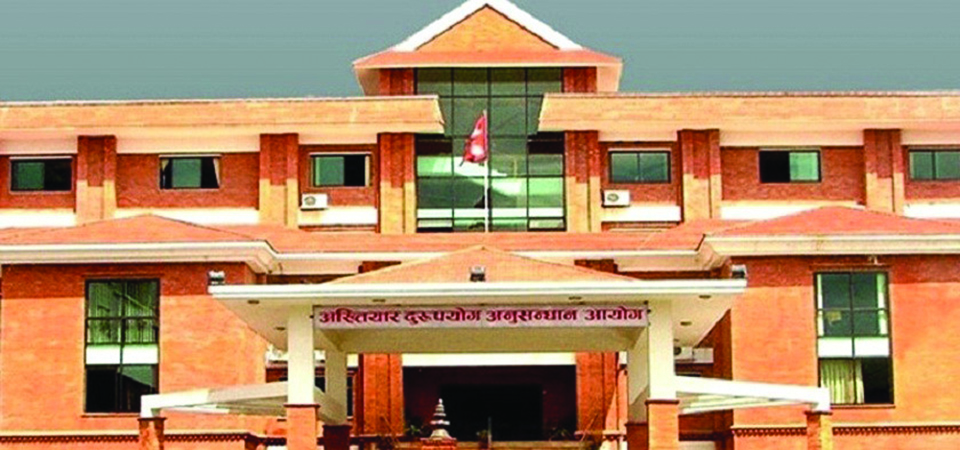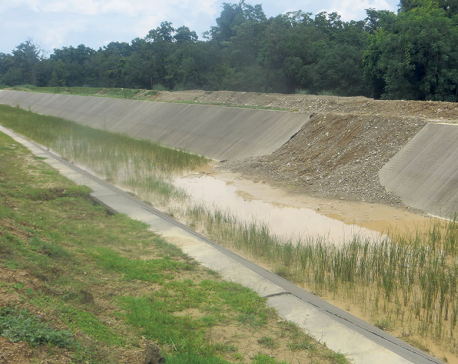
OR

The Prime Minister must be held directly responsible for all the public sector corruption that occurs and be given the authority to end it
Never trust an institution that installs a solar system which is shaded.
The Commission for the Investigation of Abuse of Authority (CIAA), Nepal’s constitutional body for investigating and prosecuting corruption in the public sector, has a 0.5 MW (mega-Watt) solar system on its roof.
Urban legend has it that when CIAA first requested government for a solar system, a much smaller one consistent with the usable roof space and aesthetics of the building was offered. But the Chief CIAA Commissioner at the time, Lokman Singh Karki, felt that it would be below the high dignity of the CIAA to have a solar system that ran in KW (kilo-Watt).
1 MW is a 1,000 KW.
Karki felt that CIAA, the highest constitutional body for tackling corruption, would be denigrated if it had a “small” system measuring in the KWs. It was, after all, the only government office to have its own swimming pool. Naturally, it needed a solar system with a size in keeping with its stature.
CIAA made it clear that it wanted a roof-top solar system that was in the MWs. The commission wasn’t footing the bill. Not that it mattered. Another government agency was overseeing and financing the system through a grant. Like everyone else in Nepal, they were only too eager to oblige.
The contractors were issued a simple directive: Even if you must have donkeys and horses with solar panels strapped on their back walking around the place, the system must measure in the MWs.
The contractors, probably paralyzed by fear by this time, began surveying every inch of roof-space, until one of them had an ingenious little idea. If you installed just over 500 KW and rounded it off in decimal point, the size could be described in MWs—0.5 MW.
A 0.5 MW (515 KW) sprawling solar roof-top system, some of it visibly shaded by a neighbouring building, was installed at CIAA. Because of this, all official statistics always refer to the solar system in CIAA as 0.5 MW instead of using the more precise KW metrics.
Lokman Singh Karki, the Chief Commissioner, has since been impeached and judged unfit for office by the Supreme Court. But his legacy of the MW solar roof-top system still looms large over the CIAA.
The sprawling 0.5 MW solar roof-top system on CIAA is a bit of a homespun engineering feat. It contains a sophisticated system and design that integrates cutting edge products. Despite the shading, the system is an example of how to squeeze a system within the space available and to satisfy the ego of an institution.
In terms of knowledge generation, the solar system in CIAA is a tragic public grant. Built with public funds of millions of rupees and meant to be a vanguard solar system for Nepal, its design and insights remain out of bounds for those interested in learning about solar in Nepal.
The system has been reportedly integrated into the grid and serves as an example for the role that solar could play in Nepal. It has done nothing to advance the mission for solar in Nepal.
But a shaded solar system is not the reason that the CIAA should be shut down.
Prime Minister should lead
In its institutional design, CIAA can never end or even significantly reduce corruption. On the contrary, it allows and encourages corruption in the public sector to continue.
The problem with CIAA stems from its source of authority.
CIAA is a constitutional body. This means that its key decision makers, the commissioners, are meant to operate independently outside of the influence of the executive and political parties. But it also absolves the executive branch of government of the need to prevent and end corruption.
Corruption in the public sector must be directly attributed to the Prime Minister. As the chief executive responsible for government, the Prime Minister cannot say that he or she did not have knowledge of it. More importantly, when corruption is detected or sensed, the Prime Minister must move swiftly to investigate, correct or punish those who engaged in corruption.
In our current form with CIAA, the Prime Minister gets a free pass.
As corruption continues, the Prime Minister can claim that CIAA, over which he has no control after all, is not working effectively. CIAA shields the Prime Minister from any responsibility for acts of corruption simply because it is CIAA’s job to investigate and prosecute.
If we want corruption to end, the Prime Minister must be directly responsible for ending it. As voters we must have the ability to measure how well the Prime Minister (and his or her party) did on ending corruption. We vote for political parties, not CIAA or other constitutional bodies.
Corruption can only end if there is a political will to do so. Only politicians we elect can exercise political will. The Prime Minister must be the chief commissioner of the CIAA.
Hero that doesn’t exist
The only reason we have CIAA as a constitutional body, removed from the influences of politics, is because we believe politicians are corrupt and don’t have the right incentives to prosecute corruption. By making it a constitutional body, we hope that it will be free of political influences and the commission will be able to operate independently. We hope it will be led by non-political independent heroes that are committed to ending corruption.
This is wishful thinking, a bit like believing that despite being shaded, the solar panel will still produce all the electricity it was designed to produce.
When corruption is deeply endemic and thoroughly entrenched, non-political independent heroes that are relentlessly committed to ending corruption don’t exist. If they do, they will never be appointed to the post of commissioner at CIAA. Instead, appointments to CIAA, as with all other constitutional bodies, are political compromises. And political compromises are great for stability and the status quo. Unfortunately, ending corruption in Nepal needs the status quo to be upset.
More importantly, our views on politicians must change. The CIAA has been established as constitutional body on the premise that politicians are corrupt, that they will not have the incentives to end corruption and that political influence will block the battle against corruption.
If that is so, why have a democracy where we vote for representatives to lead us?
We need to retain faith in those that we elect. Though we may not always agree with them, we must be able to believe that they are working on our behalf with integrity, honesty and in good faith. It is only when we have faith in our politicians and political system that it makes sense to have elections where we can boot out those who are not doing their work and elect those who will.
The CIAA must be reformed with the Prime Minister in charge of the institution. Corruption in the public sector happens under his or her watch, guidance and direction. A Prime Minister can end corruption just as easily as they allow it to flourish.
The Prime Minister can’t hide behind the CIAA like those solar panels hiding in the shade.
Bishal_thapa@hotmail.com
You May Like This

Case of corruption filed against NEA accountant
KATHMANDU, March 18: The Commission for Investigation of Abuse of Authority (CIAA) has filed a case of corruption at the... Read More...

CIAA sues 16 persons for registering public land in their name
KATHMANDU, June 18: The Commission for the Investigation of Abuse of Authority (CIAA) on Monday filed corruption cases against 16... Read More...

Pappu ousted from Sikta project
KATHMANDU, Nov 13: The Department of Water Resources and Irrigation has scrapped the contract with Pappu Construction for work on the... Read More...

Just In
- World Malaria Day: Foreign returnees more susceptible to the vector-borne disease
- MoEST seeks EC’s help in identifying teachers linked to political parties
- 70 community and national forests affected by fire in Parbat till Wednesday
- NEPSE loses 3.24 points, while daily turnover inclines to Rs 2.36 billion
- Pak Embassy awards scholarships to 180 Nepali students
- President Paudel approves mobilization of army personnel for by-elections security
- Bhajang and Ilam by-elections: 69 polling stations classified as ‘highly sensitive’
- Karnali CM Kandel secures vote of confidence



















Leave A Comment